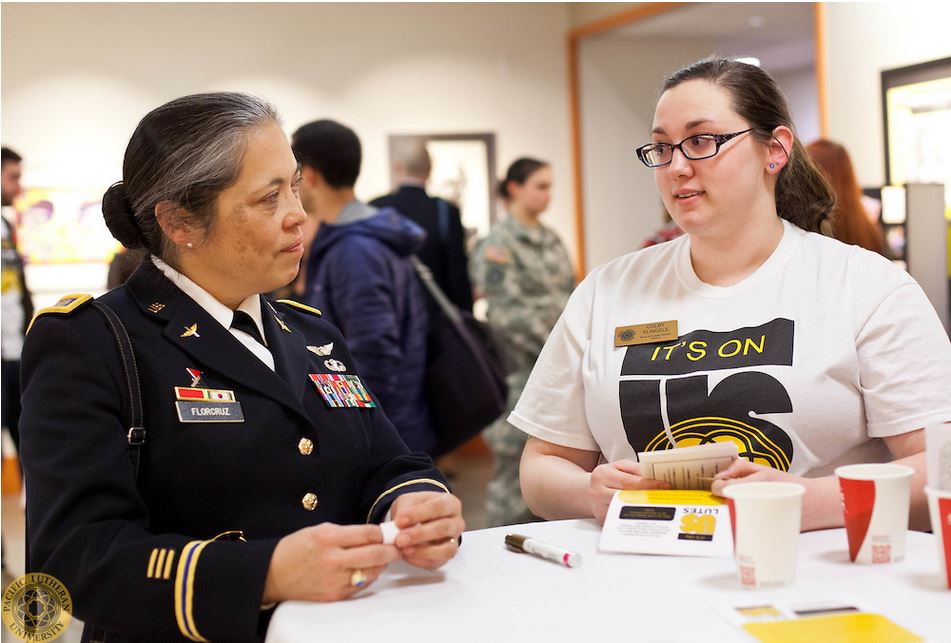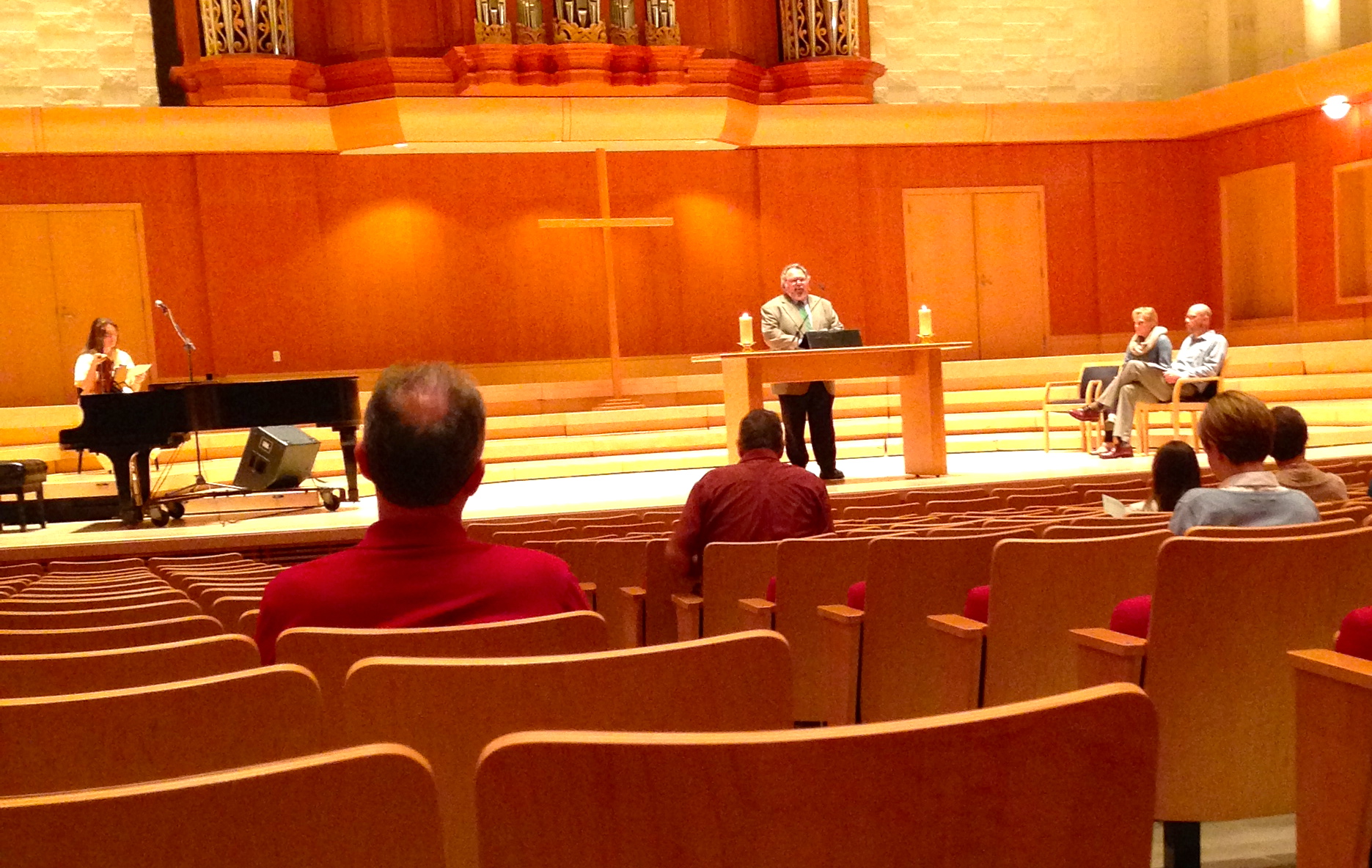Editor’s Note: After our last issue, a student on campus reached out to The Mooring Mast about wanting to share her story. This article is meant to show one student’s efforts to change rape culture on campus and how she, through her own leadership and initiative, made a real change for sexual assault victims. The last issue’s article highlighted how helpful PLU can be to students in need, this one looks into how PLU’s process became so helpful and the long road one student had to take to see a difference.
The victim elected to not name her assailant in this story because if she did, she would be expelled from Pacific Lutheran University. The accused assailant was also not contacted by The Mooring Mast in an effort to minimize harm. -Samantha Lund
Student senator Colby Klingele has made it her goal to change the conduct system for the better.
After The Mast’s last article about an anonymous student’s positive experience with PLU’s system and legal action after a sexual assault, Klingele, a junior, reached out to The Mooring Mast with a very different type of story.
Klingele said her experience going through conduct in 2012 after an assault was traumatic and frustrating.
Since then, Klingele has joined Associated Students of Pacific Lutheran University and worked with groups on campus to change the conduct system and make it more fair to victims of assault — like the anonymous student’s story in the last issue.
Colby’s Story
Klingele attended her first college party on Sept. 22, 2012. She was 22 at the time and was drinking alcohol. While at the party, she met a man who claimed to be named Shawn. She left the party to go back to his residence hall room.
Klingele said she remembers dancing together and talking to “Shawn.” The next thing she remembers is talking to him, drunk, in his room. She said she did not remember how she got to his room.
However, she said she did remember when “things” started to happen and she tried to resist.
“The next morning I was covered in bruises,” Klingele said. “I went to the Health Center and it was all documented.”
Klingele went to the Women’s Center to talk with Victim Advocate Jennifer Warwick before going to the Health Center.
Klingele said she blamed herself at the time because she was drunk and thought the assault was her fault. Warwick talked with her and explained that she was assaulted and gave her options for how to proceed.
Warwick also told Klingele that there was nobody named Sean in the Residence Hall she visited.
“I went back [and] found his door and saw what his actual name was,” Klingele said.
For Klingele, it was a wake up call.
Going Through Conduct
The only legal process that Klingele took was through PLU’s conduct system. She said she wishes she would’ve taken actual legal action, but she decided not to for a variety of reasons: she was still blaming herself, she was moving back home and studying abroad and lawyers would not take her case.
The conduct process did not live up to Klingele’s expectations. Her conduct hearing was very different than what students would experience today. Klingele and her assailant were in two separate rooms and she video called into that room so she could only see the conduct leaders and not her assailant. The call dropped many times and Klingele began to worry.
“Colby would be giving her side of the story which was traumatic and the call would just go out,” Warwick said. “It was very re-traumatizing.”
The students both gave their “sides” of the story and then they took a break and came back with questions. While Klingele was in a different room, her assailant was in the room with the conduct officers.
“He got to meet them and I never did,” Klingele said. “They got to see him, see his tears and act like he was sorry. I was just a voice on a phone, a name on a piece of paper.”
Klingele said she thinks that directly affected her hearing. However, her assailant was still found responsible. He was given a list of things he could and could not do and was put on disciplinary probation, meaning he could not be the lead of any student-led groups on campus or play in any varsity sports. He did anyway.
“They actually asked me what did I expect if I was drinking and in his room,” Klingele said. “I was just like, ‘Am I on trial for something?’”
Klingele said she was never comfortable and that the process did not seem to make a difference.
“I was counting on PLU to take care of me,” Klingele said. “It is on their [website] that they will protect students.”
After the Conduct Hearing
Once the hearing was over, Klingele thought her assailant would leave her alone. Instead, he would walk behind her to dinner, corner her while she was getting her food and wait for her outside her residence hall. He would never say anything, Klingele said — but he would always be there.
“I reported it and nothing was ever done,” Klingele said.
Her assailant would also point Klingele out in public to his friends, she said. After talking to groups at PLU about not feeling safe, Klingele was given a contract to sign. The contract split the campus in half, giving both parties parts of campus at certain times so they would never be in the same place at the same time.
“I was made out to feel like ‘you’re the one causing a big deal about this,’” Klingele said. “So I had to go out of my way and change my day.”
Klingele talked to Warwick about her experience and Warwick assured her that PLU could not restrict her to certain paths and that it was not fair. Klingele decided to speak out and take action.
Klingele said she wanted to speak out on campus about what was happening to her. She wrote an anonymous letter to President Krise titled “Dear Mr. President” in The Matrix calling him to make changes. President Krise reached out to Klingele, and in September 2014 the two met to discuss what happened to her.
“We talked for like three hours and I confronted him,” Klingele said. “He took my list and started making changes on campus.”
The Changes She’s Made
“This was not something that I sent her on her way to do,” Warwick said. “It was really cool to see her go ‘This is not right, I deserve better, this community deserves better and I’m going to do something about it.’ That’s true activism.”
Warwick gives Klingele credit for everything she’s accomplished. Warwick said Klingele did research, had courage and made a difference on her own.
The conduct process changed after Klingele’s confrontation with President Krise. Since she spoke out, the Women’s Center has become involved in training conduct officers for the first time. Officers who hold hearings about sexual assault are trained for two days by Women’s Center staff and given mock trials to practice. Before, it was all done in an eight-hour day.

The new process also allows the victim to decide how he or she wants the hearing to work. They can be in a room with or without a curtain and the officers will be in front of them, they can take turns talking in the room, or the process can take place over several days interviewing the complainant and respondent individually.
“It’s a completely different process because I feel like if they could have seen me in that room, they would have known what I was really going through,” Klingele said. “I feel like that really affected the fairness.”
Klingele gives credit to Vice President of Student Life and Dean of Students Dr. Joanna Royce-Davis, who sat with her when she became an ASPLU senator and helped figure out how to make changes on campus.
Klingele said Royce-Davis helped with the process and gave her all the information she wanted.
“She told me that since my hearing, anyone who has committed assault has been expelled,” Klingele said. “It was really nice to hear, but I was also like ‘Why can’t you make mine leave?’ It didn’t seem fair.”
Klingele also worked with Director of Student Involvement and Leadership Eva Johnson and the Resident Director of Harstad Hall Melissa Williams.
“I was just talking to someone yesterday who was afraid to go in because she did not want to see [her assailant] and I told her it’s changed and she doesn’t have to,” Klingele said. “I could see the tears [of relief] welling up in her eyes and it was really cool to see that.”
Klingele said there are many other changes coming for Warwick and her work, as well as the conduct system that she can’t share yet, but it means good things for victims.
However, with all the work she’s done, Klingele still struggles with her account. The assailant’s name is not in this article because if she shares it, she will be expelled, no questions asked. She said it feels like he is being protected more than she is.
“If someone commits sexual assault, there’s a statistic that says they will do it at least six more times, on average,” Klingele said. “That makes me ask why we are leaving this guy on campus. Like, why? Why? That just blows my mind; it’s putting people at risk.
“I was talking to Jennifer Warwick about what legacy I wanted to leave here, and we came up with: first, I wanted to have a group to carry my project on forward. And second was to have a more sound and secure hearing process for anyone who goes through conduct cases pertaining to sexual conduct. And third is more transparency from student conduct,” Klingele said.
Working with ASPLU
Klingele presented her three-year journey through this process to ASPLU on Tuesday, April 20. She is putting a group together in ASPLU to carry on her work when she is gone.
Klingele wants her role to be adopted by a group, to make the load easier and more manageable. Klingele will be staying in the area to help the group get started next year and help with anything they would need.
“I really put it on [ASPLU] saying ‘You now know me, so you know someone who this directly affects.’” Klingele said. She gave ASPLU senators and representatives a call to make a difference in campus rape culture. “I made it clear that if someone discloses their story to [an ASPLU representative], you give them the resources and help them,” Klingele said.
If students want to get involved in Klingele’s cause, they can contact her at girlwiththemagicpen@gmail.com


















